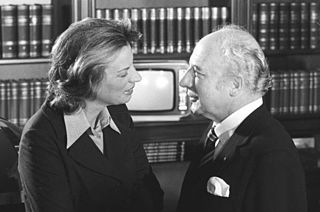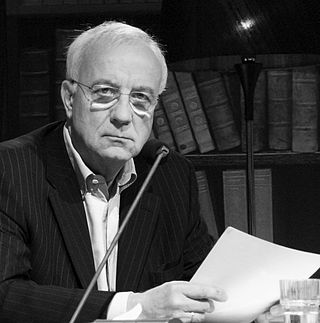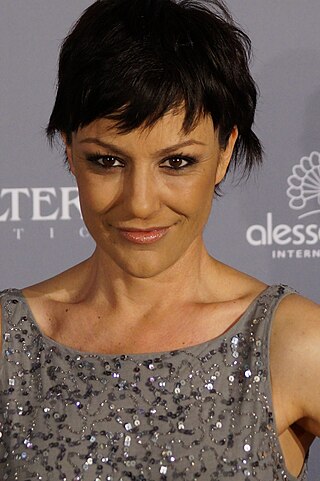
The federal city of Bonn is a city on the banks of the Rhine located in the German state of North Rhine-Westphalia, with a population of over 300,000. About 24 km (15 mi) south-southeast of Cologne, Bonn is in the southernmost part of the Rhine-Ruhr region, Germany's largest metropolitan area, with over 11 million inhabitants. It is a university city, was the birthplace of Ludwig van Beethoven and was the capital of West Germany from 1949 to 1990. Bonn was the seat of government of reunited Germany from 1990 to 1999.

Iridology is an alternative medicine technique whose proponents claim that patterns, colors, and other characteristics of the iris can be examined to determine information about a patient's systemic health. Practitioners match their observations to iris charts, which divide the iris into zones that correspond to specific parts of the human body. Iridologists see the eyes as "windows" into the body's state of health.

Mildred Scheel was a German physician, the second wife of the President of the Federal Republic Walter Scheel and the founder of the German Cancer Aid.

The Gottfried Wilhelm Leibniz Prize, or Leibniz Prize, is awarded by the German Research Foundation to "exceptional scientists and academics for their outstanding achievements in the field of research". Since 1986, up to ten prizes have been awarded annually to individuals or research groups working at a research institution in Germany or at a German research institution abroad. It is considered the most important research award in Germany.

The German Cancer Research Center is a national cancer research center based in Heidelberg, Germany. It is a member of the Helmholtz Association of German Research Centres, the largest scientific organization in Germany.
The "war on cancer" is the effort to find a cure for cancer by increased research to improve the understanding of cancer biology and the development of more effective cancer treatments, such as targeted drug therapies. The aim of such efforts is to eradicate cancer as a major cause of death. The signing of the National Cancer Act of 1971 by United States president Richard Nixon is generally viewed as the beginning of this effort, though it was not described as a "war" in the legislation itself.

Georg Uecker is a German actor. Since 1985, he has played the character of Dr. Carsten Flöter on the popular German TV series Lindenstraße on ARD. Controversially, in 1987, he kissed Gert Weinbauer. This was the first gay kiss in a German series in the evening. A second kiss was in 1990 with character Robert Engel this brought about discussions on LGBT topics in the media. Uecker still continues to play the character. His other television credits include Schillerstraße and he is often a guest on Genial daneben. He is an LGBT-activist and lives in Cologne.
The International Cancer Genome Consortium (ICGC) is a voluntary scientific organization that provides a forum for collaboration among the world's leading cancer and genomic researchers. The ICGC was launched in 2008 to coordinate large-scale cancer genome studies in tumours from 50 cancer types and/or subtypes that are of main importance across the globe.

Mildred Mosler Weisenfeld is the Brooklyn-born founder of national not-for-profit foundation the National Council to Combat Blindness in 1946, now known as Fight for Sight, an organization based in New York City that provides initial funds to promising scientists early in their careers. For 50 years, Weisenfeld was a one-woman campaign to increase funding for eye research, despite losing her own vision and having no scientific training.
Ferdinand A. Hermens was a German-American political scientist and economist. He was born in Nieheim, Kreis Höxter (district) in Germany and he died in Rockville, MD (U.S.). His major books "Democracy or Anarchy?" (1941) and "The Representative Republic" (1958) were translated into German, Italian and Hebrew. His most important contribution to the progress of political science was his analysis of the impact that electoral systems have in structuring party competition. Hermens advised U.S. Congressional committees on Presidential Election Procedure, the Judiciary and Divided Powers and Economic Policy, the U.S. government on re-organization of democracy in Germany and the government of Trinidad and Tobago on constitutional matters.

Gunther Hartmann is a German immunologist and clinical pharmacologist. Since 2007 he has been the Director of the Institute of Clinical Chemistry and Clinical Pharmacology at the University Hospital of the University of Bonn.

Molecular diagnostics is a collection of techniques used to analyze biological markers in the genome and proteome, and how their cells express their genes as proteins, applying molecular biology to medical testing. In medicine the technique is used to diagnose and monitor disease, detect risk, and decide which therapies will work best for individual patients, and in agricultural biosecurity similarly to monitor crop- and livestock disease, estimate risk, and decide what quarantine measures must be taken.

Fritz Ferdinand Pleitgen was a German television journalist and author. He was correspondent in Moscow, East Berlin and Washington. Pleitgen was a supporter of Willy Brandt's Ostpolitik. In 1988, Pleitgen became editor-in-chief of television of Germany's then-largest public broadcaster, Westdeutscher Rundfunk (WDR), and was director of WDR from 1995 to 2007. He is regarded as one of the most influential German journalists and media makers. In 2010, he was the manager of Ruhr.2010, a project of European Capital of Culture.
Peter Propping was a German human geneticist.

The Representation of the European Commission in Germany is a representation of the European Commission with the head office located in Berlin. There are two more regional representation offices in Bonn and Munich. Jörg Wojahn is in charge of the representations in Germany since 1 September 2019,.
Detlef Kühn is a German commentator. A qualified jurist, he is a former politician and broadcasting director. He is also noted as a genealogist.
Heinz Geese, also Heinz Gieese) was a German composer, pianist, conductor and arranger.

Georg Peters was a German physician, microbiologist and university professor. From 1992 until his fatal mountain accident he headed the Institute of Medical Microbiology at the University of Münster. He was an internationally recognised expert in the field of staphylococci and the infectious diseases caused by them, to which he had devoted himself since the beginning of his scientific career.

Miriam Pielhau was a German television and radio presenter, author and actress.
Anca-Ligia Grosu is a Romanian-German radiation oncologist and professor with a research focus on the development of personalized therapy in radiation oncology. She is chair of the Radiation Oncology Department at the University Medical Center Freiburg, Germany, and member of the German National Academy of Sciences Leopoldina.














